15 dicas de coaching de vendas que realmente funcionam
Descubra o que os treinadores de vendas mais eficazes têm em comum e ajude sua equipe a ter sucesso com essas 15 dicas de treinamento de vendas!

✅ Free meeting recording & transcription
💬 Automated sharing of insights to other tools.

Fonte da imagem: rawpixel. com em freepik. com
O coaching de vendas é uma ferramenta poderosa que fornece aos profissionais de vendas orientação, recursos e suporte inestimáveis para ajudá-los a alcançar suas metas. Continue lendo para aprender tudo o que você precisa saber e muito mais!
O que é coaching de vendas?
O coaching de vendas é o processo de ensinar, orientar e apoiar profissionais de vendas para melhorar seu desempenho e alcançar suas metas.
É uma abordagem contínua e personalizada que ajuda as equipes de vendas a desenvolver suas habilidades, entender seus pontos fortes e fracos e desenvolver seu conhecimento sobre processos de vendas, comportamento do cliente e estratégias de comunicação eficazes.
Por meio do coaching, os vendedores podem ter mais sucesso no fechamento de negócios e na melhoria do relacionamento com os clientes. A utilização de ferramentas como transcrição de áudio e anotações com IA pode agilizar o processo e fornecer informações valiosas.
Como você oferece à sua equipe o melhor treinamento como gerente de vendas? Aqui está o que você precisa saber!
Coach de vendas versus gerente de vendas
Você provavelmente está se perguntando onde termina o gerenciamento de uma equipe de vendas e onde começa o treinamento de uma equipe de vendas. Embora seja comum que os gerentes de vendas treinem suas equipes, aqui está a principal diferença entre os dois:
- Um gerente de vendas é responsável pelo gerenciamento de vendas, definindo objetivos e metas para a equipe e avaliando os resultados.
- Um coach de vendas fornece orientação e aconselhamento sobre técnicas de vendas, ajudando os vendedores a melhorar seu desempenho de vendas. Eles também ajudam os vendedores na definição de metas, resolução de problemas e motivação.
O coach de vendas normalmente trabalha com a equipe de vendas individualmente, enquanto o gerente de vendas supervisiona a equipe como um todo.
Por que o coaching de vendas é importante?
O treinamento de vendas eficaz é uma ferramenta essencial para melhorar a eficácia e a eficiência de sua equipe de vendas.
Aqui estão os principais benefícios de qualquer programa eficaz de coaching de vendas, junto com algumas dicas de coaching de vendas para maximizar esses benefícios:
- Melhora o desempenho de vendas
- Melhora o atendimento ao cliente
- Incentiva a colaboração
- Desenvolve habilidades
- Promove a criatividade
- Aumenta a motivação
Vamos examinar mais de perto o que cada um desses benefícios acarreta.
1. Melhora o desempenho de vendas
O coaching de vendas ajuda funcionários e gerentes de vendas a identificar seus pontos fortes e fracos para ter um melhor desempenho. Também pode ajudá-los a reconhecer oportunidades de aumentar as vendas.
2. Melhora o atendimento ao cliente
O coaching de vendas pode ajudar sua equipe a aprender as melhores maneiras de interagir com os clientes, especialmente ao usar um equipamento de alto nível Serviço telefônico VoIP para facilitar seus esforços de comunicação.
3. Incentiva a colaboração
Bons treinadores de vendas podem ajudar a construir relacionamentos mais fortes entre equipes e promover a colaboração entre vendas e plataformas de marketing o que leva a uma maior colaboração e uma melhor solução de problemas.
4. Desenvolve habilidades
Com a abordagem correta, você pode ajudar sua equipe a melhorar as habilidades essenciais de vendas, como comunicação, negociação e solução de problemas.
5. Promove a criatividade
O coaching de vendas pode ajudar os funcionários a desenvolver soluções criativas para os problemas dos clientes e descobrir novas oportunidades.
6. Aumenta a motivação
Você pode ajudar a motivar os membros da equipe fornecendo feedback e reconhecendo seus sucessos. Isso cria uma atmosfera positiva, que leva ao aumento da moral e da satisfação no trabalho.
Desafios comuns de coaching de vendas
O coaching de vendas não é uma tarefa fácil ou isolada. É um comportamento contínuo, em que a ênfase está em ajudar os membros da equipe a aumentar seu desempenho, ajudá-los a crescer e, finalmente, alcançar o sucesso.
Assim como qualquer coisa relacionada a vendas, o coaching de vendas vem com seu próprio conjunto de desafios, sendo os mais comuns:
- Fornecendo feedback efetivo
- Melhorando as técnicas de vendas
- Ajudando os representantes de vendas a definir metas
- Construindo um processo de vendas eficaz
- Adaptação às metas de negócios
Aqui está o que você precisa saber sobre cada um deles!
1. Fornecendo feedback efetivo
Fornecer feedback eficaz é um desafio comum de coaching de vendas, pois exige que os gerentes ofereçam críticas construtivas e reforços positivos de uma forma que motive os vendedores e lhes permita crescer.
Dar feedback eficaz significa que você precisa dedicar sua energia para analisar cuidadosamente como sua equipe realiza suas tarefas diárias. A melhor maneira de garantir que seu feedback seja realmente eficaz é estruturá-lo de forma específica, acionável, consistente e equilibrada.
Ter uma imagem clara do desempenho de seus representantes de vendas significa que você geralmente precisa estar presente em mais de um lugar ao mesmo tempo. O MeetGeek permite que você tenha todos os seus chamadas de vendas gravadas, transcritos, resumidos e armazenados em um só lugar.
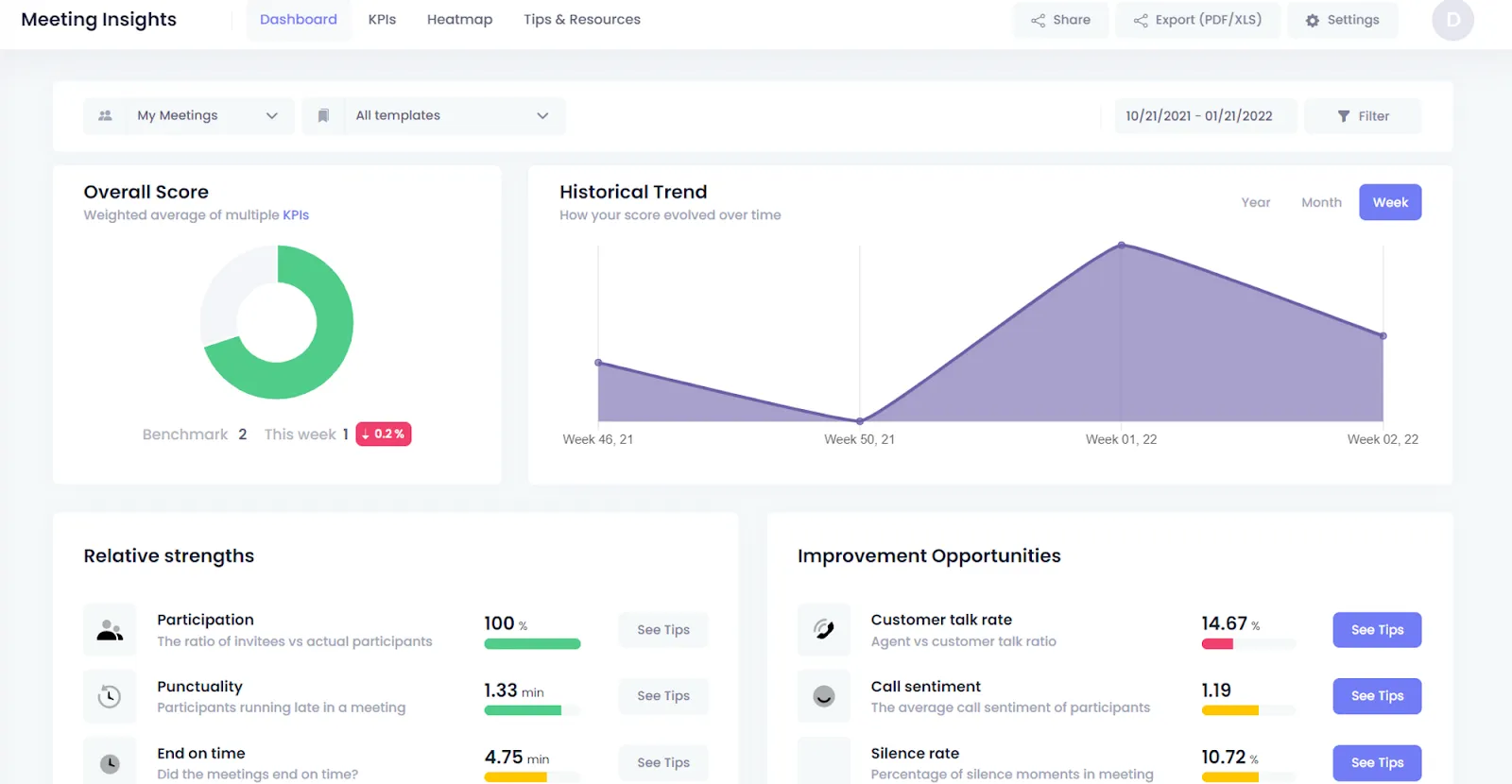
2. Melhorando as técnicas de vendas
Melhorar as técnicas de vendas exige que os vendedores desenvolvam uma compreensão das necessidades e preferências de seus clientes e criem uma abordagem personalizada para vender.
Os vendedores também devem entender as tendências atuais do mercado e o cenário competitivo para se manterem à frente da concorrência. Além disso, eles devem aprender a criar estratégias e táticas de vendas eficazes que impulsionarão mais vendas. Eles devem saber como se relacionar de forma eficaz neste primeiro mundo virtual; ferramentas como cartões de visita digitais pode ajudá-los a interagir de forma inteligente.
3. Ajudando os representantes de vendas a definir metas
Estabelecer metas é uma das etapas mais importantes para ajudar os representantes de vendas a concentrarem seus esforços e determinarem seu sucesso. Sem metas, os representantes de vendas talvez não consigam se concentrar nas atividades certas e priorizar seu tempo e seus esforços.
Para ajudar seus representantes a definir metas, considere usar a estrutura SMART. SMART significa Específico, Mensurável, Atingível, Relevante e Limitado no Tempo. Essa estrutura fornece uma maneira clara e concisa de definir metas que sejam significativas e alcançáveis.
Especificamente, como coach de vendas, você pode usar a estrutura SMART para ajudar os representantes de vendas a definir metas claramente definidas, mensuráveis, alcançáveis, relevantes para seu trabalho e com um cronograma definido.
4. Construindo um processo de vendas eficaz
Sem um processo de vendas eficaz, é difícil para os vendedores entregarem resultados de forma consistente e atingirem suas metas. Identificar e resolver quaisquer fraquezas ou lacunas no processo de vendas fornece à sua equipe as ferramentas necessárias para ter sucesso. Os processos de vendas precisam refletir as mudanças nas necessidades dos clientes, nas tendências do mercado e nas melhores práticas.
Para facilitar as coisas, priorize sempre testar e refinar os processos que você já tem em vigor, além de estar aberto a substituí-los por soluções mais eficazes.
5. Adaptação às metas de negócios
Como escreveu Spencer Johnson em seu livro Quem mexeu no meu queijo, “veja o que você está fazendo de errado, ria disso, mude e faça melhor”. A adaptação às mudanças é um desafio comum de coaching de vendas porque o processo de vendas está em constante evolução.
As equipes de vendas devem adaptar continuamente suas estratégias e processos às metas de negócios para se manterem à frente da concorrência.
15 técnicas e dicas eficazes de coaching de vendas
Compilamos uma lista das 15 melhores técnicas de coaching que qualquer coach de vendas eficaz deve conhecer:
- Siga uma abordagem formal
- Reúna-se frequentemente com sua equipe de vendas
- Concentre-se no bem-estar dos representantes de vendas
- Adote uma abordagem exclusiva para cada representante de vendas
- Motive seus gerentes de vendas e equipes
- Permita que cada representante de vendas crie seu próprio plano de ação
- Responsabilize seus representantes de vendas
- Prepare-se e pratique com vários cenários de coaching
- Atualize suas sessões de treinamento de vendas
- Invista em programas e recursos adicionais de treinamento de vendas
- Incentive as equipes de vendas a se autoavaliarem
- Monitore o desempenho de vendas e ajuste conforme necessário
- Saiba como fornecer feedback adequadamente
- Compartilhe celebrações (e fracassos)
- Concentre-se em uma melhoria por vez
Veja como aproveitar ao máximo cada uma dessas dicas!
1. Siga uma abordagem formal
Uma abordagem formal no coaching de vendas é essencial por vários motivos. Primeiro, garante que todos os participantes entendam as expectativas e metas de todo o processo, o que garante que o coaching seja conduzido de forma profissional e produtiva.
Em segundo lugar, promove consistência e responsabilidade entre todos os participantes. Isso permite que todos trabalhem juntos em prol de um objetivo comum.
Em terceiro lugar, ajuda a garantir que o coaching se concentre nas áreas que precisam ser melhoradas, em vez de perder tempo com tópicos que não estão relacionados ao desempenho de vendas.
Por fim, uma abordagem disciplinada e estruturada do coaching de vendas pode ser facilmente monitorada e medida. Todos esses elementos ajudam a aumentar a eficácia do coaching, o que acaba resultando em melhor desempenho de vendas e melhores relacionamentos com os clientes.
2. Reúna-se frequentemente com sua equipe de vendas
Reunir-se frequentemente com sua equipe durante o treinamento de vendas é fundamental para analisar o progresso, identificar áreas de melhoria e garantir que todos trabalhem com os mesmos objetivos.
Uma maneira de fazer isso é realizar reuniões semanais de equipe, nas quais cada membro da equipe possa atualizar o restante da equipe sobre seu progresso, os desafios que estão enfrentando e os sucessos que tiveram. Durante essas reuniões, a equipe deve discutir quaisquer novas estratégias de vendas, revisar feedback do clientee debata ideias para novas abordagens.
Além das reuniões semanais, é essencial reunir-se regularmente com membros individuais da equipe para analisar seu desempenho, fornecer feedback e discutir quaisquer mudanças que precisem ser feitas. Essas reuniões individuais também devem ser usadas para conversar com os membros da equipe e garantir que eles se sintam apoiados e motivados.
3. Concentre-se no bem-estar dos representantes de vendas
Os representantes de vendas são a força vital de qualquer empresa. Eles geralmente trabalham em ambientes de alto estresse e ritmo acelerado e podem ficar facilmente sobrecarregados se não receberem o suporte adequado.
Concentre-se em ajudar os representantes de vendas a gerenciar melhor o estresse e a ansiedade, criar resiliência e permanecer positivos. Saiba como reconhecer sinais de esgotamento e como ajudar os representantes de vendas a cuidarem de si mesmos. Forneça à sua equipe os recursos necessários para se manter motivada e produtiva, como acesso a mentores e oportunidades de desenvolvimento profissional.
4. Adote uma abordagem exclusiva para cada representante de vendas
Cada representante de vendas tem objetivos, motivações, pontos fortes e fracos diferentes que você deve levar em consideração ao criar um programa de treinamento de vendas. Ao adotar uma abordagem exclusiva para cada representante de vendas durante o treinamento de vendas, você maximizará o potencial de cada indivíduo.
Pergunte a eles como você pode ajudar e o que eles precisam de você para ter mais sucesso e alcançar seus objetivos. Ofereça você mesmo algumas sugestões: específicas ferramentas de vendas para otimizar seu trabalho, treinamento adicional sobre produtos, etc. Concentre-se nas metas e motivações do indivíduo. Pergunte a cada representante de vendas com o que eles precisam de ajuda e o que esperam alcançar.
Além disso, aprenda a identificar seus pontos fortes e fracos e use essas informações para criar um programa de treinamento de vendas que se concentre em suas áreas de desenvolvimento e, ao mesmo tempo, utilize seus pontos fortes.
5. Motive seus gerentes de vendas e equipes
Motivar seus gerentes de vendas e equipes durante o treinamento de vendas é essencial para garantir sessões de treinamento eficazes e manter todos engajados e focados.
O coaching de vendas deve ser um processo contínuo que ajude os representantes a refinar suas habilidades, e isso só é possível se a equipe estiver motivada a participar e assumir um papel ativo nas sessões de treinamento.
Uma forma de motivar seus gerentes de vendas e equipes durante o coaching de vendas é enfatizar a importância do treinamento e como ele os beneficiará. Você também pode usar incentivos, como recompensas e reconhecimento, para motivá-los, pois é mais provável que os representantes compareçam se souberem que há algo para eles.
Outra forma de motivar seus gerentes de vendas e equipes durante o treinamento de vendas é criar uma atmosfera de colaboração e suporte. Incentive seus representantes a trabalharem juntos como uma equipe, o que ajudará a construir relacionamentos e promover um senso de camaradagem.
Além disso, crie um diálogo aberto em que os representantes possam compartilhar livremente suas ideias e receber feedback de seus colegas, pois isso fará com que se sintam valorizados e apreciados.
6. Permita que cada representante de vendas crie seu plano de ação
Quando se trata de treinamento de vendas, é importante permitir que cada representante de vendas crie seu próprio plano de ação. Isso permite que os representantes de vendas assumam o controle de seu próprio desenvolvimento, permitindo que alcancem suas metas de uma forma adaptada aos seus pontos fortes e objetivos individuais.
Os representantes de vendas precisam estar ativamente engajados em seu crescimento e desenvolvimento, em vez de seguir passivamente as instruções. Para permitir que cada representante de vendas crie seu próprio plano de ação, comece ajudando a definir as metas do representante de vendas. Isso pode ser feito discutindo as metas gerais de negócios, bem como as metas individuais do representante de vendas.
Depois que essas metas forem estabelecidas, trabalhe com o representante de vendas para criar um plano de ação que descreva as etapas necessárias para alcançar essas metas. Esse plano de ação deve incluir tarefas específicas, o cronograma para conclusão e quaisquer recursos que possam ser necessários.
7. Responsabilize seus representantes de vendas
Responsabilizar seus representantes de vendas garante que eles sejam responsabilizados por seus sucessos e fracassos e que também estejam tomando as medidas necessárias para alcançar suas metas.
Para responsabilizar seus representantes de vendas durante o treinamento de vendas, comece definindo expectativas claras para eles. Certifique-se de que eles entendam as metas que precisam alcançar, o que precisam fazer para chegar lá e os prazos que precisam cumprir. Crie um plano para acompanhar seu progresso e fornecer feedback sobre seu desempenho. Isso os ajuda a se manterem no caminho certo e progredirem em direção a suas metas.
8. Prepare-se e pratique com vários cenários de coaching
Preparar e praticar com vários cenários de coaching ajuda os representantes de vendas a se tornarem melhores em seu trabalho. Isso permite que eles pratiquem diferentes técnicas e estratégias que podem usar em diferentes situações.
Isso também ajuda os representantes de vendas a se prepararem melhor para conversas desafiadoras e fornece as ferramentas necessárias para lidar com possíveis objeções e fechar vendas. Para se preparar e praticar com vários cenários de coaching, você deve primeiro identificar as principais habilidades e técnicas que os membros da sua equipe precisam melhorar.
Exercícios de RPG são atividades vitais de coaching de vendas. Eles ajudam os representantes a praticar e refinar suas habilidades em um ambiente controlado, preparando-os para cenários da vida real.
Por exemplo, se o representante de vendas precisar aprimorar sua capacidade de fazer perguntas eficazes, crie alguns cenários que lhe permitam praticar essas habilidades. Ao final de cada sessão de coaching, forneça à sua equipe estratégias e técnicas para ajudá-la a melhorar seu desempenho em cada cenário.
9. Atualize suas sessões de treinamento de vendas
Essa é uma parte essencial do ensino de representantes. como melhorar o upselling, identifique as necessidades dos clientes, crie apresentações e demonstrações, resolva objeções e feche negócios. Seu treinamento de vendas também deve incluir as melhores práticas, técnicas e estratégias para prospectar leads qualificados e acompanhar os clientes.
Para aprimorar seu treinamento de vendas, adapte-o às necessidades individuais de cada representante. Também é importante criar um ambiente de aprendizado que seja favorável e encorajador e oferecer aos representantes a oportunidade de praticar suas habilidades em um ambiente seguro e sem julgamentos.
10. Invista em programas e recursos adicionais de coaching de vendas
Investir em mais software de treinamento de vendas e os recursos podem oferecer benefícios tangíveis à sua equipe de vendas. Isso ajuda os representantes a conhecerem melhor o produto da sua empresa, desenvolverem melhores relacionamentos com os clientes e, por fim, impulsionarem mais vendas.
Os programas de treinamento e treinamento de vendas podem fornecer à sua equipe informações sobre as necessidades e preferências do cliente, identificar áreas de melhoria e ajudar sua equipe a desenvolver novas habilidades ou refinar as existentes. Usando um ferramenta de treinamento tudo-em-um pode tornar esse processo muito mais fácil.
Para garantir o sucesso de seu treinamento de vendas, invista nos melhores recursos e programas que atendam às necessidades de sua equipe e ao seu orçamento. Isso prepara sua equipe para ter sucesso em suas funções e aumentar suas vendas.
11. Incentive as equipes de vendas a se autoavaliarem
Incentivar as equipes de vendas a se autoavaliarem durante o coaching de vendas é uma forma eficaz de ajudá-las a se tornarem mais conscientes de seu desempenho e a se responsabilizarem.
Para fazer isso, forneça a eles expectativas e metas claras. Permita que os representantes criem seu próprio processo de autoavaliação personalizado. Isso os ajuda a se concentrar em suas necessidades individuais e a desenvolver estratégias que os atendam.
12. Monitore o desempenho de vendas e ajuste conforme necessário
Para monitorar o desempenho das vendas e ajustá-lo conforme necessário, você precisa ter um sistema de análise de vendas instalado. Isso deve incluir métricas como taxas de conversão, preço médio de venda e taxa de fechamento. Além disso, acompanhe o número de chamadas feitas e o número de reuniões presenciais.
Depois de estabelecer essas métricas, analise o desempenho de cada representante de vendas regularmente. Quando os representantes de vendas não estiverem atingindo seus objetivos, forneça feedback e orientação. Revise e ajuste continuamente suas estratégias de coaching para garantir que elas permaneçam eficazes e alinhadas com suas metas. Essa é uma parte fundamental de como treinar uma equipe de vendas.
Por exemplo, se um representante de vendas está com dificuldades para fechar negócios, talvez seja necessário concentrar seu treinamento em estratégias para aumentar a taxa de fechamento.
As reuniões desempenham um papel crucial no processo de vendas. No entanto, monitorar cada reunião em que seus representantes de vendas participam é impossível. Com um assistente virtual de reuniões de IA, como MeetGeek, é mais fácil do que nunca avaliar seu desempenho de vendas. O MeetGeek registra, transcreve, analisa e resume suas reuniões de vendas — automaticamente!

13. Saiba como fornecer feedback adequadamente
O feedback é essencial para um treinamento de vendas eficaz e uma parte crucial do processo de aprendizado, pois permite que o vendedor compreenda seus pontos fortes e fracos e faça os ajustes necessários. Ao fornecer feedback, seja específico e forneça exemplos tangíveis de sucessos e áreas de melhoria.
Procure ser positivo em sua entrega e concentre-se nos aspectos positivos do desempenho do vendedor. Seja consistente com seu feedback e forneça sessões de treinamento de acompanhamento para garantir que o vendedor possa melhorar/saber o que melhorar.
Ao dedicar um tempo para fornecer feedback adequadamente durante o treinamento de vendas, você pode garantir que seus vendedores recebam as ferramentas necessárias para atingir suas metas.
14. Compartilhe celebrações (e fracassos)
Compartilhar celebrações e fracassos ajuda a criar uma atmosfera de confiança, incentiva o aprendizado e oferece uma oportunidade de refletir sobre o que foi alcançado e o que pode ser melhorado.
Para compartilhar celebrações e fracassos durante coaching de vendas, concentre-se em criar um diálogo aberto e honesto com a equipe de vendas. Faça perguntas que permitam que seus representantes falem de forma aberta e sincera sobre suas realizações e fracassos. Seja direto sobre seus próprios sucessos e fracassos para incentivar sua equipe a aprender com suas experiências.
Sempre reconheça e celebre os sucessos de sua equipe de vendas. Celebrar os sucessos não apenas incentiva um maior crescimento, mas também ajuda a criar uma atmosfera positiva e solidária dentro da equipe.
15. Concentre-se em uma melhoria de cada vez
Concentrar-se em uma melhoria por vez garante que o coaching seja eficaz e que toda a equipe tenha a melhor chance de sucesso. Incentive uma mentalidade de melhoria contínua. Essa abordagem pode levar ao aumento da produtividade ao longo do tempo e é uma marca registrada de métodos eficazes de treinamento de vendas.
Ao treinar um vendedor, pode ser tentador tentar abordar várias áreas de melhoria ao mesmo tempo. No entanto, essa abordagem provavelmente não será eficaz, pois pode ser opressora para o vendedor. Concentrar-se em uma melhoria por vez permite que você comece com as áreas mais importantes que precisam ser abordadas.
Crie um plano para abordar cada área. O plano deve incluir metas, estratégias e prazos específicos. Ofereça tempo suficiente para praticar as habilidades necessárias para alcançar as metas estabelecidas no plano. Dessa forma, cada vendedor é capaz de se concentrar efetivamente em suas metas e progredir em seu desenvolvimento.
Comece sua jornada para um coaching de vendas bem-sucedido!
Seguindo essas 15 técnicas e dicas, você está no caminho certo para se tornar um ótimo coach de vendas e criar uma nova geração de líderes de vendas em pouco tempo!
E enquanto você está nisso, experimente o MeetGeek gratuitamente para ver por si mesmo como um assistente virtual de reuniões com IA pode aprimorar a forma como você faz coaching de vendas gravando, transcrevendo, analisando e resumindo automaticamente todas as suas sessões de coaching!

.avif)




















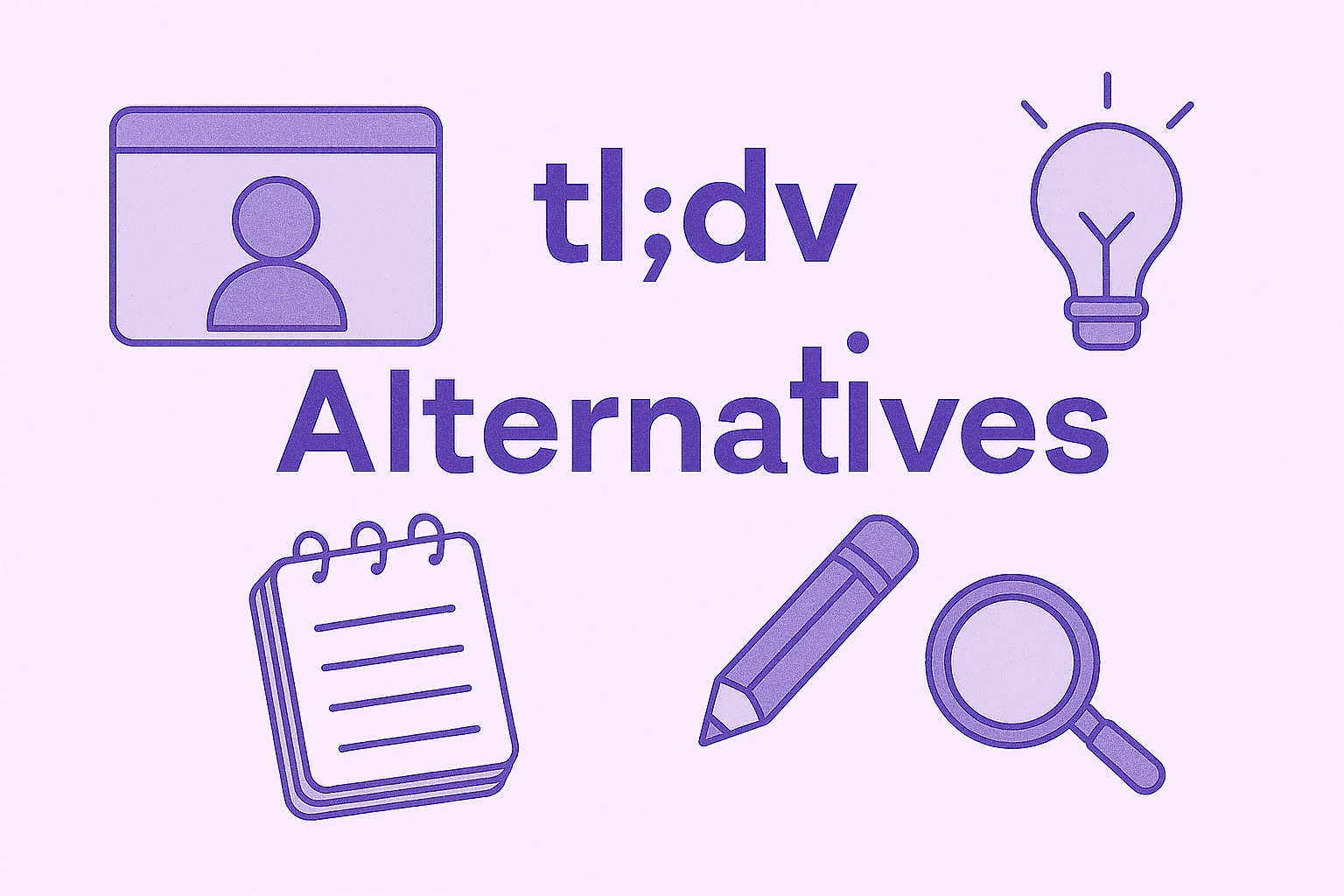







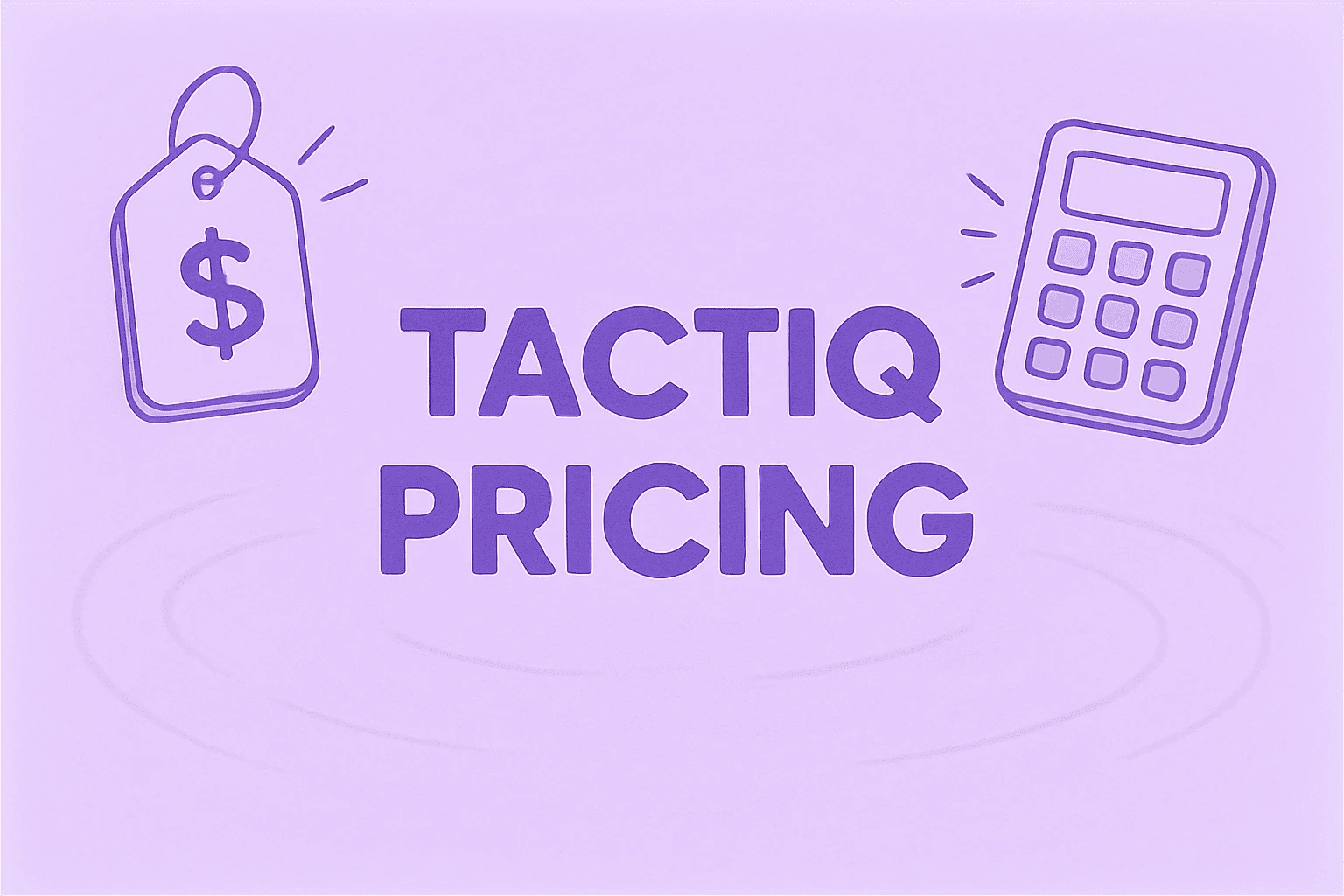







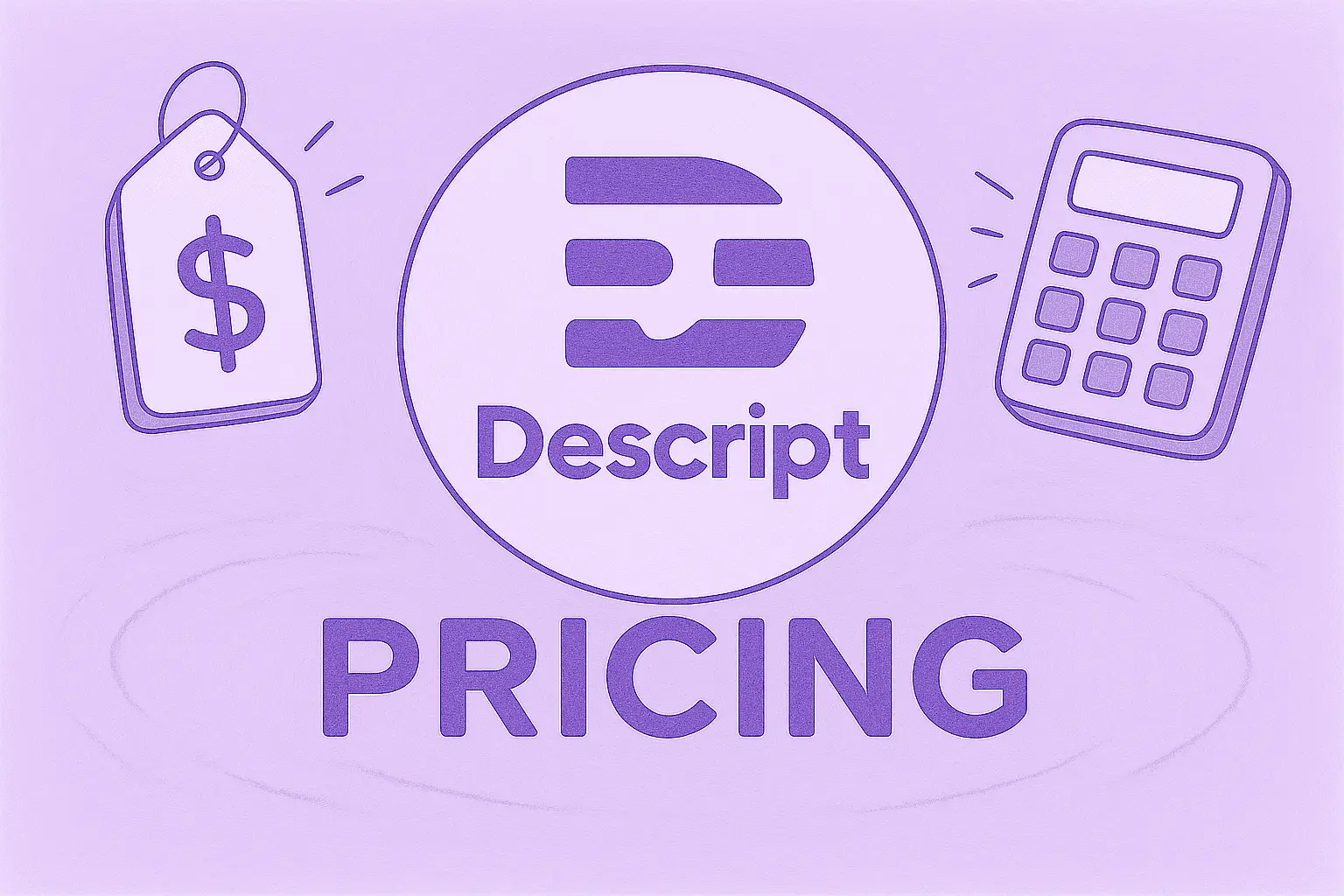



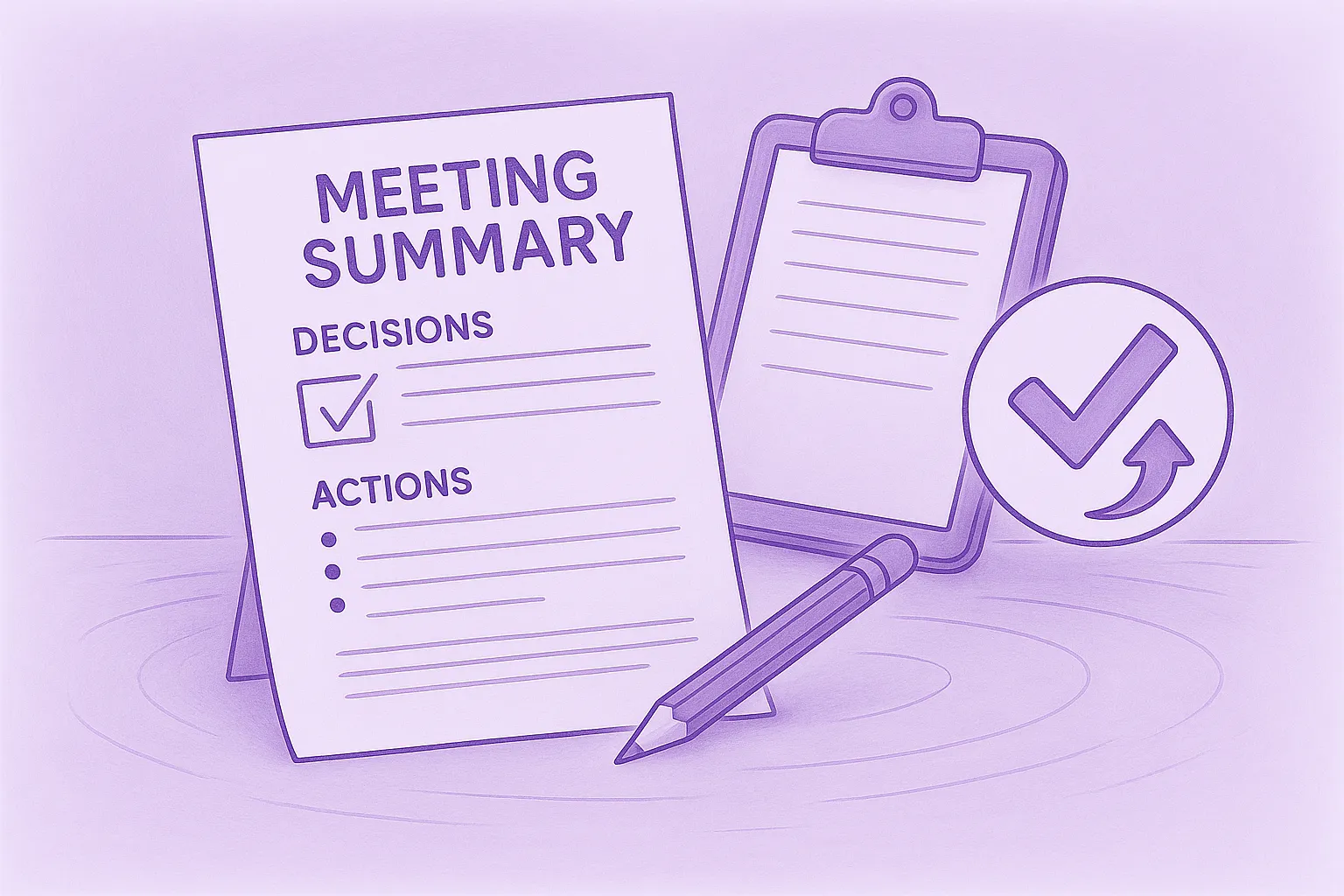


























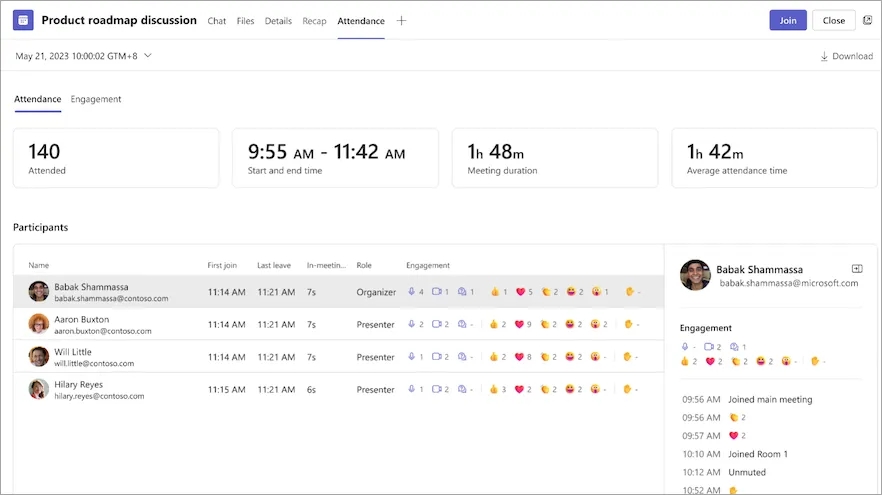










.webp)







.webp)












.webp)




